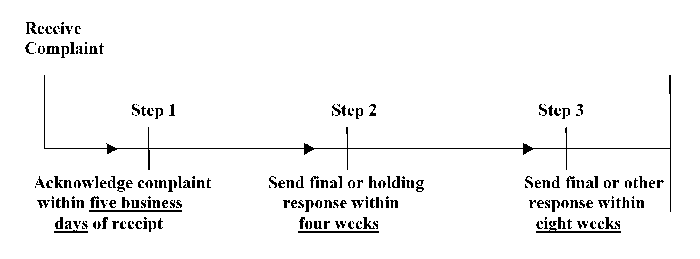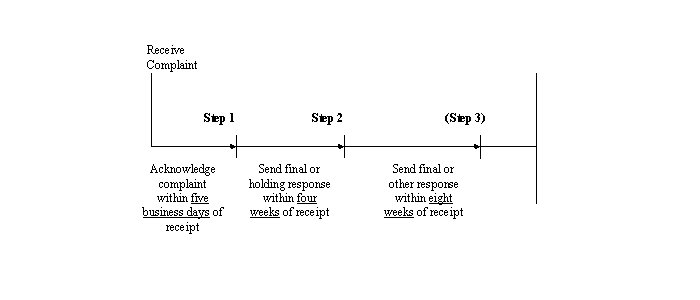SIFA 11
Complaints
SIFA 11.1
How to handle a complaint
- 01/12/2004
SIFA 11.1.1
See Notes

- 09/09/2005
SIFA 11.1.2
See Notes

- 09/09/2005
SIFA 11.1.3
See Notes

- 09/09/2005
SIFA 11.1.4
See Notes

- 09/09/2005
SIFA 11.1.5
See Notes

- 09/09/2005
SIFA 11.1.6
See Notes

- 09/09/2005
SIFA 11.1.7
See Notes


- 09/09/2005
SIFA 11.1.8
See Notes

- 09/09/2005
When and where should you publicise your procedures?
SIFA 11.1.9
See Notes

- 09/09/2005
How quickly do you need to deal with a complaint?
SIFA 11.1.10
See Notes


- 09/09/2005
SIFA 11.1.11
See Notes

| Step 1 | Within five business days | |
|
-send a copy
of your internal complaints procedures; and-inform them
who will be handling the complaint; or-inform the complainant
of the referral by way of a final response and include the other firm's contact
details.
| ||
| Step 2 |
Within four weeks
Send a final response - including: | (It should be a separate document and written in plain English) |
|
-a summary of
the complaint;-details of any
offer made;-right your client
has to go to the FOS;-a copy of the
leaflet about the FOS - 'your complaint and the ombudsman';-a summary of
your investigation;-the time limit
on any offer made; and-the six-month
time limit for referrals to the FOS.
| ||
| Or send a holding response | ||
| Explaining why you are not yet in a position to resolve the complaint and indicating when you will make further contact with the client. | ||
| Step 3 |
Within eight weeks
Send a final response | |
| As per the details in step 2 above. | ||
| Or a response explaining: | ||
|
-why you are
not able to respond;-when you expect
to provide a final response;-explaining that
the client is entitled to refer the complaint to the FOS if unhappy with the
delay;-the reasons
for the delay;-giving a copy
of the leaflet about the FOS - 'your complaint and the ombudsman'; and-the six-month
time limit for referrals to the FOS.
| ||
- 09/09/2005
SIFA 11.1.12
See Notes

- 09/09/2005
SIFA 11.1.13
See Notes

- 09/09/2005
Exception to the rules: quick resolution of complaints
SIFA 11.1.14
See Notes

- 09/09/2005
SIFA 11.1.15
See Notes

- 09/09/2005
Charging customers for handling their complaints
SIFA 11.1.16
See Notes

- 09/09/2005
SIFA 11.1.17
See Notes

- 09/09/2005
SIFA 11.1.18
See Notes

- 09/09/2005
Cooperation with the financial ombudsman service
SIFA 11.1.19
See Notes

- 09/09/2005
SIFA 11.1.20
See Notes

- 09/09/2005
Mortgage endowment complaints
SIFA 11.1.21
See Notes

www.fsa.gov.uk/pubs/ceo/ceo_letter_4apr02.pdf
www.fsa.gov.uk/pubs/ceo/ceo_letter_23jan04.pdf
- 09/09/2005
Where are the relevant Handbook sections?
SIFA 11.1.22
See Notes

- 09/09/2005
Record keeping requirements
SIFA 11.1.23
See Notes

| Information about a complaint that you should keep: | |
| The name of the complainant. | The substance of the complaint. |
| Copies of correspondence between your firm and the complainant. | Details of any redress offered by your firm. |
| Documentation relating to the referral of a complaint | |
| The following section of the Guide is also relevant: | |
| • | 'Complaints reporting to the FSA' - Chapter 11.2 |
| If you do mortgage or general insurance business you should also refer to MIGI 14. | |
- 09/09/2005
SIFA 11.2
Complaints reporting to the FSA
- 01/12/2004
SIFA 11.2.1
See Notes

- 09/09/2005
Why do you need to submit a complaints report?
SIFA 11.2.2
See Notes

- 09/09/2005
When are the reporting periods?
SIFA 11.2.3
See Notes

- 09/09/2005
SIFA 11.2.4
See Notes

- 09/09/2005
SIFA 11.2.5
See Notes

- 09/09/2005
How do you submit a report?
SIFA 11.2.6
See Notes

- 09/09/2005
Where are the relevant Handbook sections?
SIFA 11.2.7
See Notes

| The following sections of the Guide are also relevant: | |
| • | 'How to handle a complaint' - Chapter 11.1 |
| • | 'Reporting requirements' - Chapter 12.1 |
- 09/09/2005
